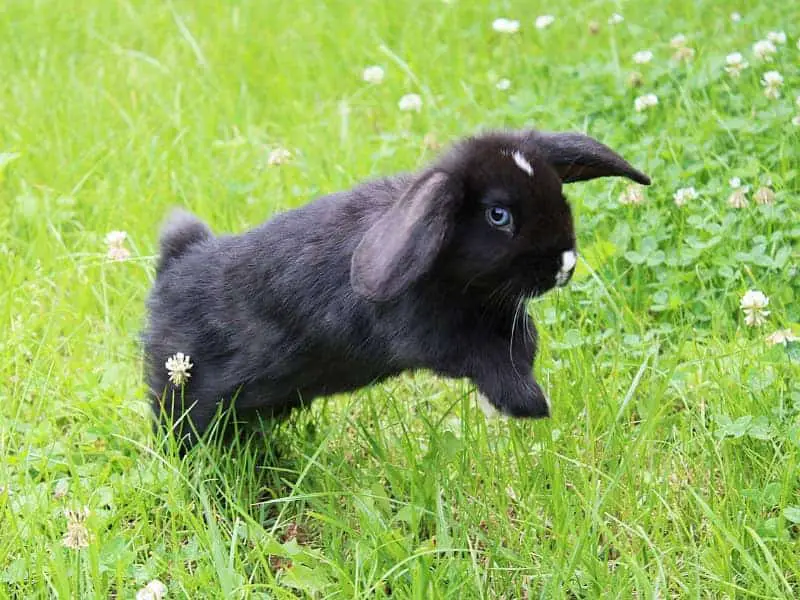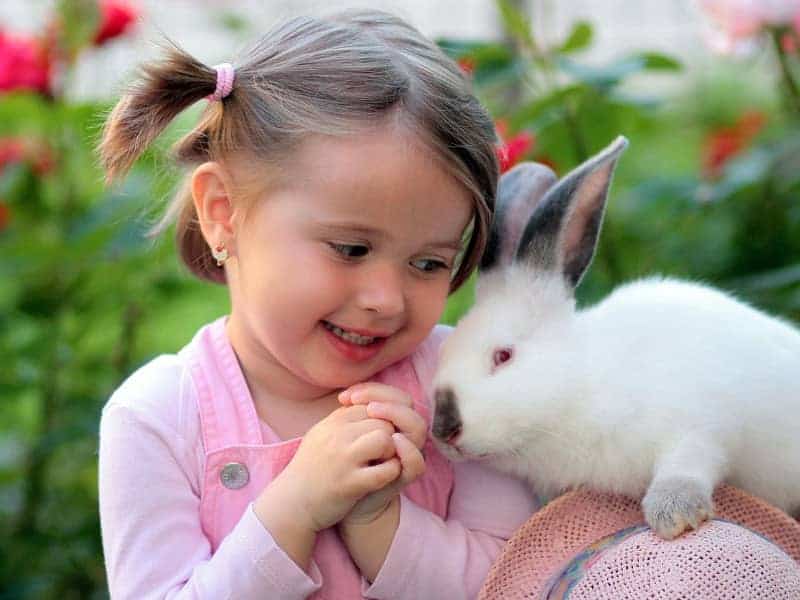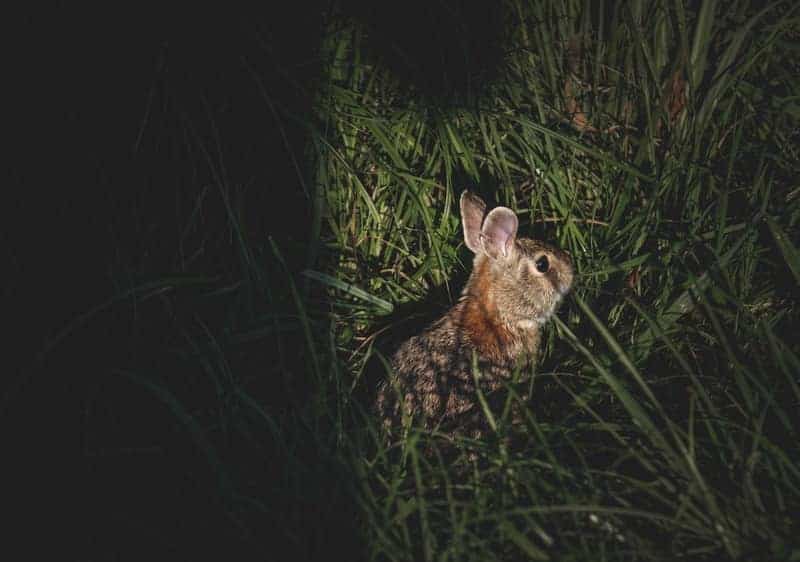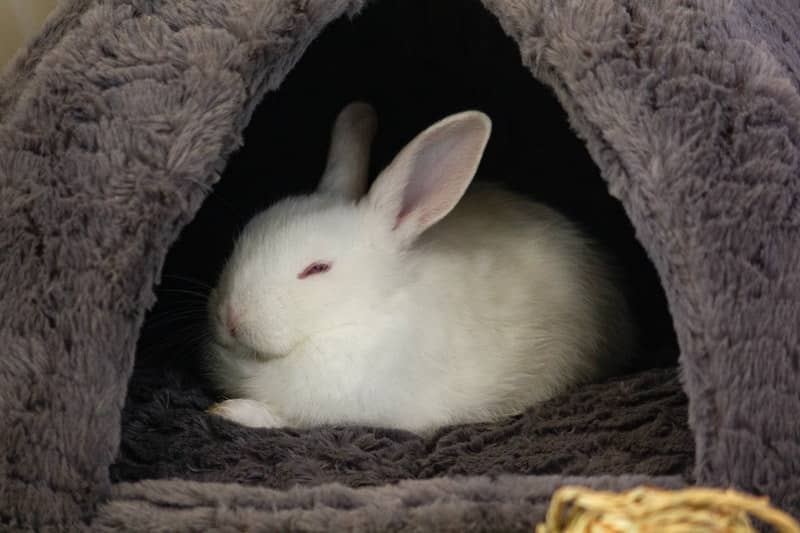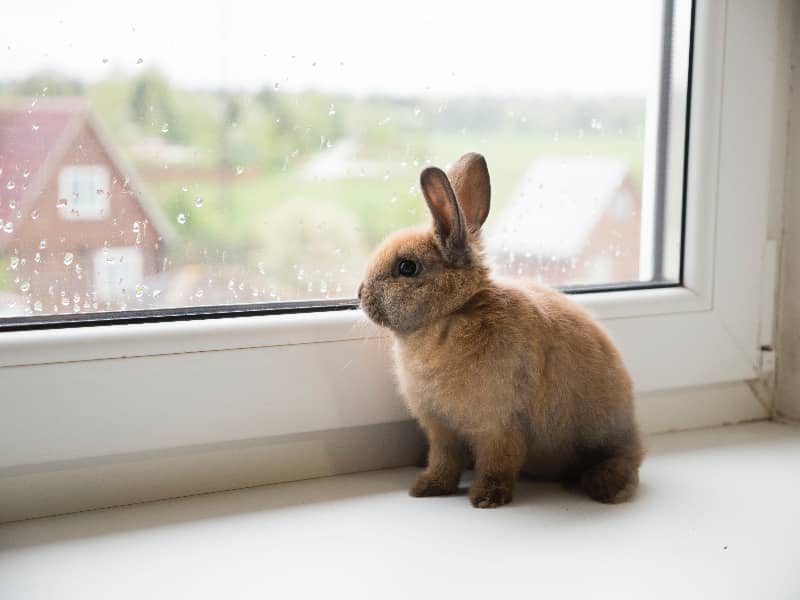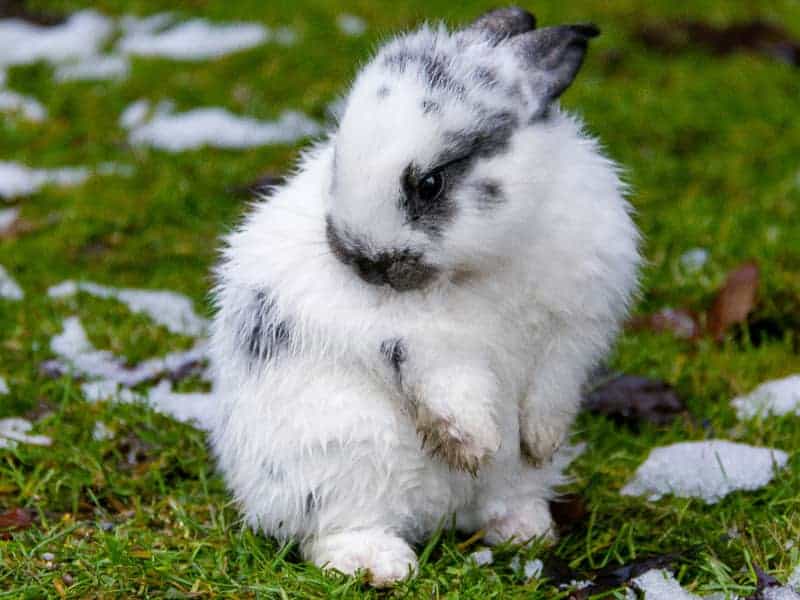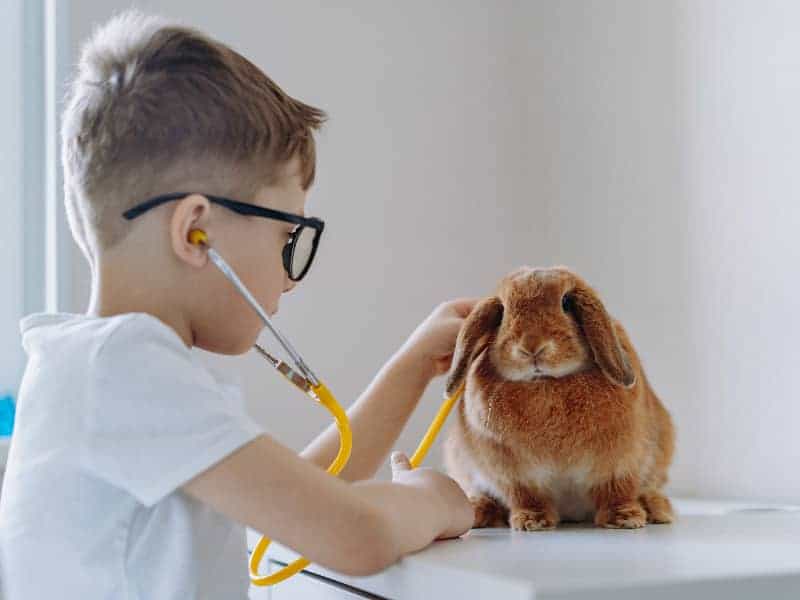
Signs that your rabbit may be sick
Hello! If you are a proud rabbit owner, then you surely know how important it is that your fluffy friend is happy and healthy. Unfortunately, rabbits can get sick just like us humans. It's important to recognize the signs of illness early so you can react in time to provide your rabbit with the best care possible.
In this blog article, we'll introduce you to some important signs to look for to determine if your rabbit might be sick. Of course, I'm not a veterinarian, but these tips can help you identify potential problems so you can quickly give your fluffy companion the attention and medical care he needs.
- Signs that your rabbit may be sick
- Noticeable changes in feeding behavior
- Changes in feces
- Noticeable changes in behavior
- Unclean eyes and nose
- Weight changes
- Coat problems
- Breathing difficulties
- Changes in urine
- Posture and movement
- Changed sounds
- Dental problems
- Restlessness and aggressiveness
- Susceptibility to infections
- Changed drinking habits
- Changes in the change of coat
- Importance of visits to the vet
- Prevention and tips to promote the health of your rabbit
- Conclusion
Noticeable changes in feeding behavior
Rabbits are known to be gourmets, and they usually have a healthy appetite. If your rabbit suddenly refuses its food or eats significantly less than usual, this could be an indication of illness. Also observe if there are any problems chewing or if he has difficulty eating his treats. A sudden change in eating behavior may indicate dental problems, gastrointestinal upset or other health issues.
Changes in feces
Yes, we know the topic isn't glamorous, but your rabbit's droppings can actually provide important information about his health. Look for diarrhea, which is indicated by runny or mushy droppings, or constipation, which can result in small, dry, hard poop balls. Discolored or bloody feces is also a red flag. If you notice such changes, it is advisable to see a veterinarian immediately.
Noticeable changes in behavior
Rabbits have their own personalities and behaviors. If you notice sudden changes in your rabbit's behavior, it may be an indication of discomfort or pain. For example, a normally sociable rabbit that suddenly withdraws, or a quiet rabbit that suddenly becomes restless, could be signs that he is not well.
Unclean eyes and nose
Healthy Rabbits usually have clear eyes and a clean nose. If you notice discharge, tearing, or adhesions in the eyes, or if your rabbit's nose is stuffy or smudged, this could indicate an infection or other condition. Keep an eye on your rabbit's eyes and nose for early detection of potential problems.
Weight changes
Sudden weight gain or loss can be a warning sign. If your rabbit loses weight unexpectedly, it may indicate various diseases or even parasites. In contrast, unexplained weight gain may indicate digestive problems or hormonal imbalances. Keep an eye on your rabbit's weight and contact a veterinarian if you notice any changes.
Coat problems
Your rabbit's coat is a good indicator of its health. Healthy rabbits have a shiny, soft coat that is clean and evenly distributed. If you notice bald spots, dandruff, matting or skin irritation, it could indicate an infection, parasites or an allergic reaction. Also pay attention to whether your rabbit is brushing or scratching more, as this can also indicate skin problems.
Breathing difficulties
Difficulty breathing can be a sign of respiratory problems or infection. Pay attention to whether your rabbit is wheezing, gasping, or snorting. Heavy breathing, especially if accompanied by breathing sounds, should not be ignored as it may indicate a serious condition.
Changes in urine
Observing your rabbit's urine can also provide important information about his health. Pay attention to whether the urine smells unusually strong, has an abnormal color, or even shows traces of blood. Dark, cloudy or reddish urine may indicate kidney problems, bladder infections or other conditions. A sudden increased or decreased urge to urinate should also be taken seriously.
Posture and movement
Rabbits are naturally curious and active animals. If your rabbit suddenly seems listless, hops around less, or has difficulty walking, this may indicate pain or muscle problems. Also, look for any unusual posture your rabbit may be assuming, such as a lowered head position or a hunched back.
Changed sounds
Although rabbits are mostly quiet animalsbut if you notice changes in the sounds your rabbit makes, you should listen more closely. For example, loud teeth grinding or sudden cries may indicate pain or discomfort. Changes in breathing sounds may also indicate respiratory problems.
Dental problems
Dental problems are not uncommon in rabbits. Look for signs such as increased drooling, decreased appetite, weight loss, or changes in chewing behavior. If your rabbit's teeth become too long, this can lead to painful injuries. Regular checkups with your veterinarian and an appropriate diet that promotes tooth wear are important to prevent dental problems.
Restlessness and aggressiveness
If your normally tame and loving rabbit suddenly becomes agitated or exhibits aggressive behavior, he may be stressed or uncomfortable. Stress can have a negative effect on health and weaken the immune system. Try to find out if there is anything in his environment that triggers stress and provide him with a calm and safe environment.
Susceptibility to infections
Rabbits can also be prone to infections, especially in the digestive tract. Diarrhea or other digestive problems can be signs that your rabbit's immune system is weakened. Make sure your rabbit receives a balanced diet and regular veterinary exams to detect and treat potential infections early.
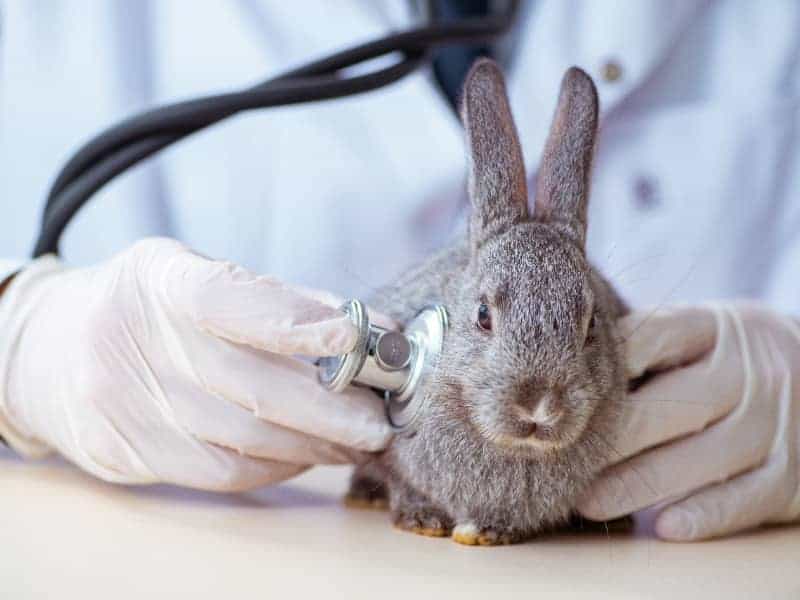
Changed drinking habits
Observe if your rabbit suddenly drinks less or not at all. Dehydration can quickly lead to serious health problems. Make sure fresh, clean water is always available and make sure your rabbit drinks enough, especially on warm days.
Changes in the change of coat
Rabbits have two annual shedding cycles, during which they shed their fur and grow new fur. However, if you notice that your rabbit is shedding excessively or has bald spots, this may indicate problems with the skin, coat or overall health. Also be on the lookout for parasites such as fleas or mites that may be hiding in the fur.
Importance of visits to the vet
Finally, I want to stress the importance of scheduling regular veterinary visits for your rabbit. An experienced veterinarian can thoroughly examine your rabbit and detect health problems early. Don't rely solely on internet research or amateur diagnoses when it comes to your furry friend's health.
Prevention and tips to promote the health of your rabbit
Healthy diet
A balanced and species-appropriate diet is critical to your rabbit's health. Make sure it gets a sufficient amount of high-quality hay, fresh vegetables and herbs, and a limited amount of pellets and fruit.
Make sure foods are fresh and show no signs of mold or spoilage. Good nutrition not only supports overall health, but also helps prevent dental problems.
Sufficient movement and space
Rabbits are naturally active animals and need plenty of room to roam freely. Make sure your rabbit can spend enough time outside its cage or enclosure to hop and play. A species-appropriate enclosure or living environment that is large enough will not only promote your rabbit's physical health, but also his well-being.
Clean environment
A clean and hygienic environment is essential to prevent disease in rabbits. Clean the cage or enclosure regularly to remove feces, urine and food debris. Make sure the water is changed daily and the food is free of dirt and contaminants. A clean environment reduces the risk of infection and other health problems.
Parasite prevention
Rabbits can be infested with parasites such as fleas, mites and worms. Keep your rabbit free of these unwelcome guests by regular veterinary examinations and appropriate preventive measures. Your veterinarian can help you choose the appropriate anti-parasite medication for your rabbit.
Social interaction
Rabbits are social animals and feel most comfortable in the company of other rabbits. If you have only one rabbit, consider the possibility of acquiring a conspecific for companionship. Keep in mind that socialization must be carefully planned and introduced. Positive social interaction can improve your rabbit's well-being and quality of life.
Stress Reduction
Stress can have a negative impact on your rabbit's health. Avoid loud noises and unpredictable events that could cause stress. Provide a calm and stable environment where your rabbit feels safe. Caring and compassionate handling can also help reduce stress and increase your rabbit's confidence.
Early visits to the vet
I can't stress this enough: Regular veterinary checkups are critical to ensuring your rabbit's health. A veterinarian can detect potential problems early and treat them in a timely manner. The earlier a disease is detected, the better the chances for a full recovery.
Conclusion
Your rabbit's health and well-being are of great importance, and through attention, care, and preventative measures, you can help ensure that he or she lives a happy and healthy life. Monitor regularly for the above signs of illness and don't be afraid to consult a veterinarian if you are unsure. With the right care and love, you will surely enjoy a full life with your fluffy companion.
I hope this detailed blog article has helped you better understand the signs of illness in your rabbit and given you tips for a healthy lifestyle. Your rabbit will thank you! If you have any other questions or suggestions, feel free to share them with me. Stay tuned, there are many more exciting topics waiting for you on this blog!
Author

-
Garden animal - A life with nature
Welcome to my animal blog! My name is Dirk and I am happy to take you on my journey through the fascinating world of animals and gardening.
Born 54 years ago, I have had an insatiable curiosity for the animal world around me since childhood. Although I have moved professionally in other industries, my true passion has always been animals and nature. It is remarkable how a small garden has become such an important part of my life.
Many of my fondest memories are associated with the animals that share our home. Whether it's the curious squirrels that scurry across the trees in the morning, the colorful variety of birds that visit our feeders, or the busy bees and butterflies that pollinate our flowers, every moment with them is invaluable to me.
This blog is my contribution to share my experiences, discoveries and insights with like-minded people. Here I will share stories of unforgettable encounters with animals, give tips on gardening and creating wildlife-friendly habitats, and take you on my journeys through nature.
Thank you so much for being here!
Cordial,
Dirk aka garden animal
Last posts
- 27. February 2024PetsVeganes Hundefutter – Grün und Gesund?
- 18. January 2024ChickensOregano für Hühner
- November 27, 2023HamsterDiurnal hamsters
- November 24, 2023HamsterHamster hammock

